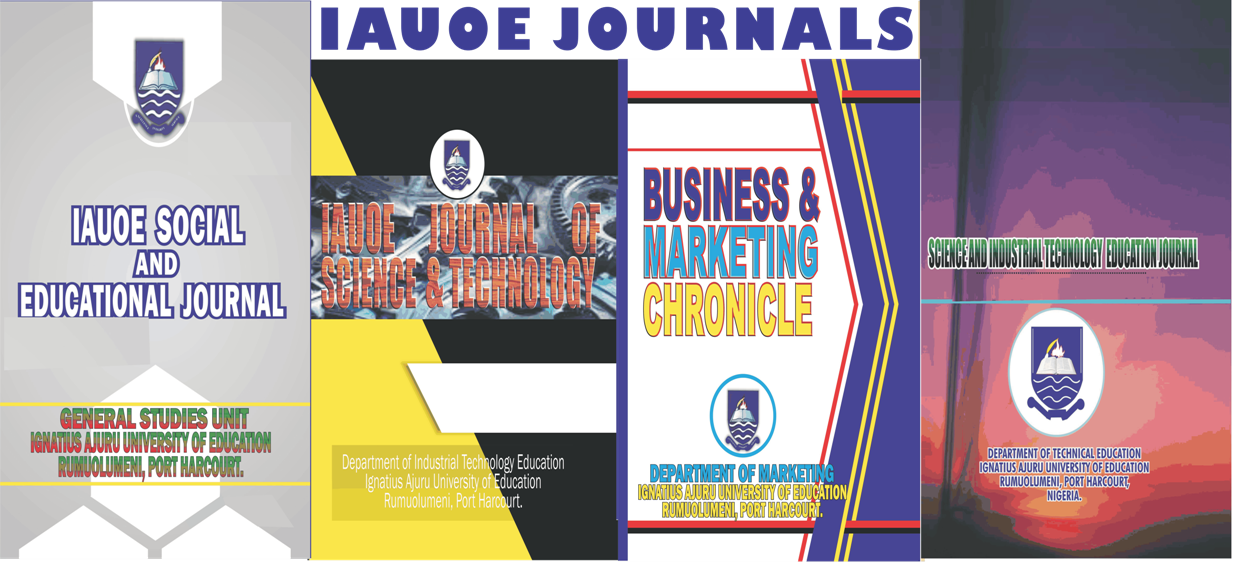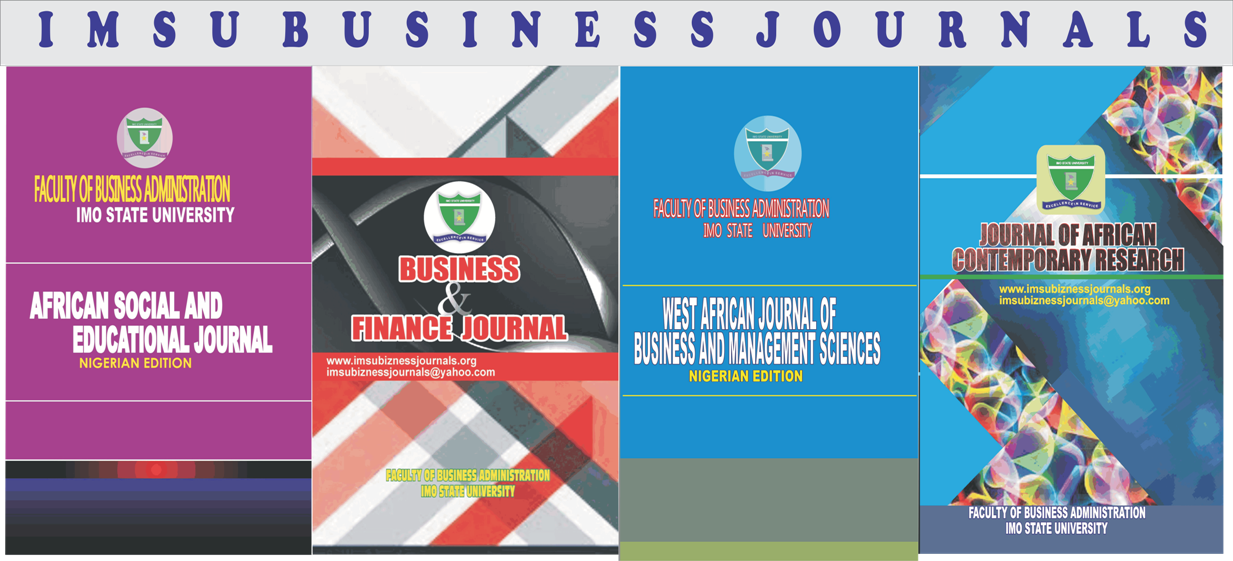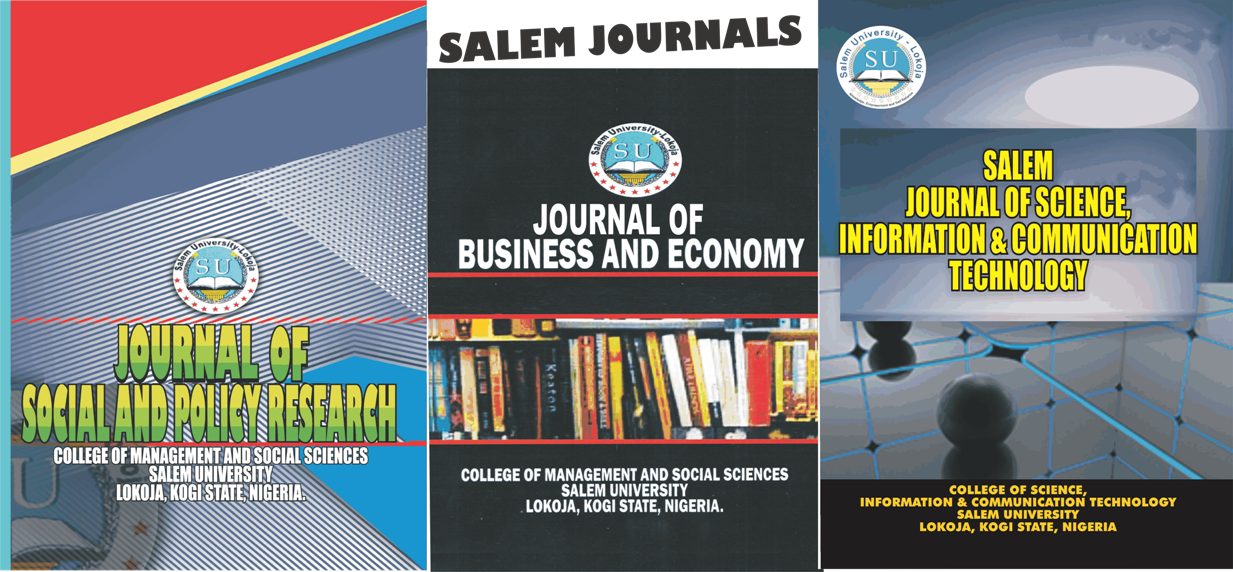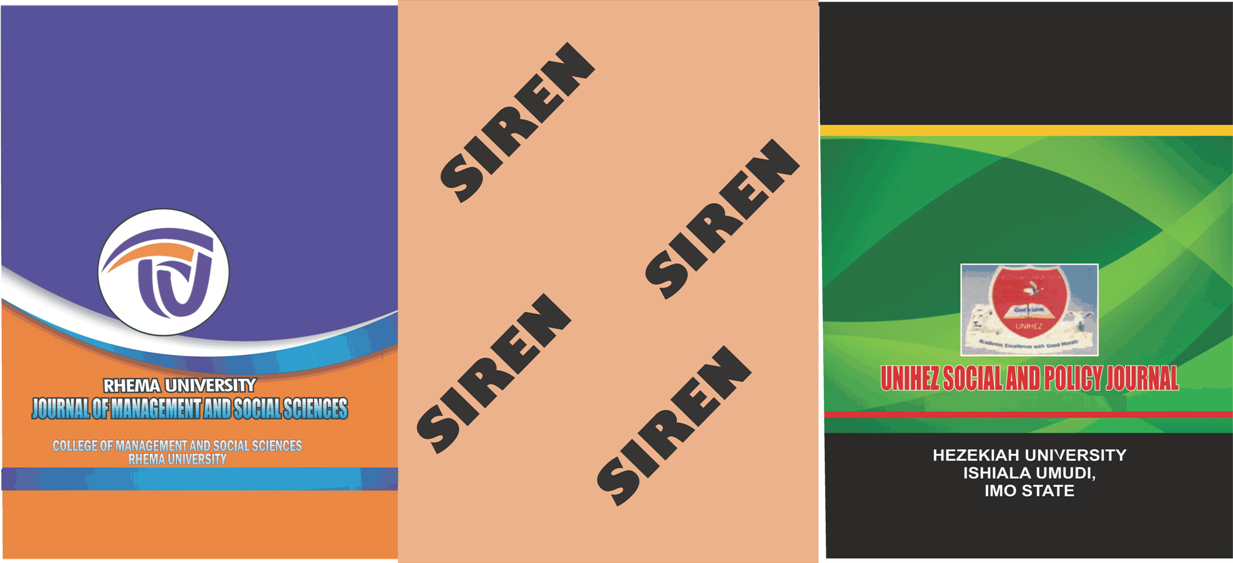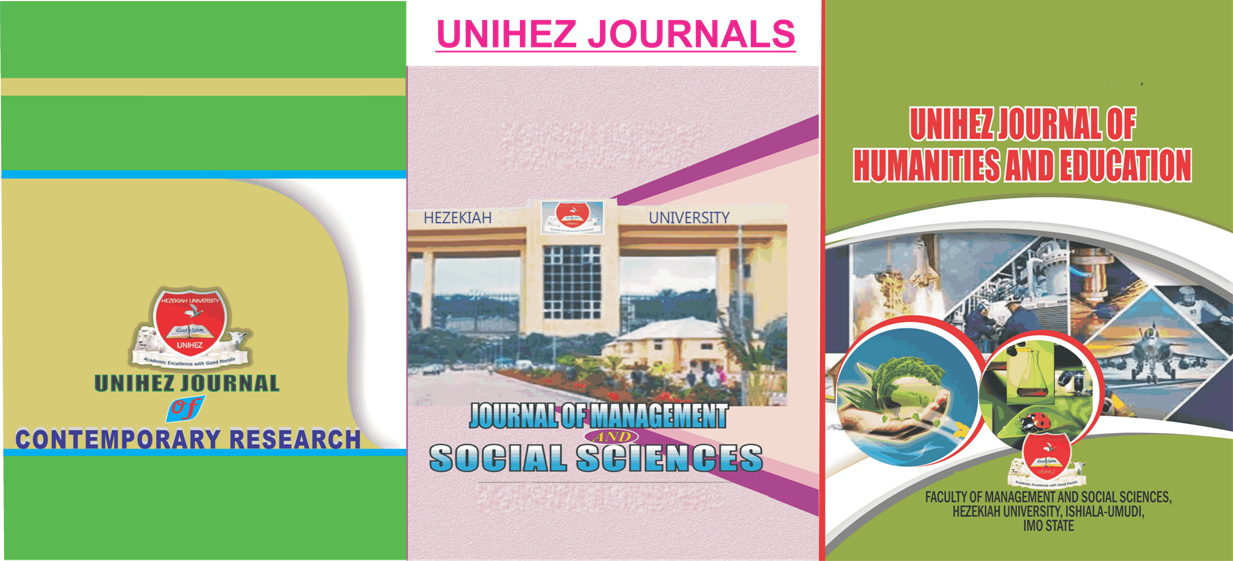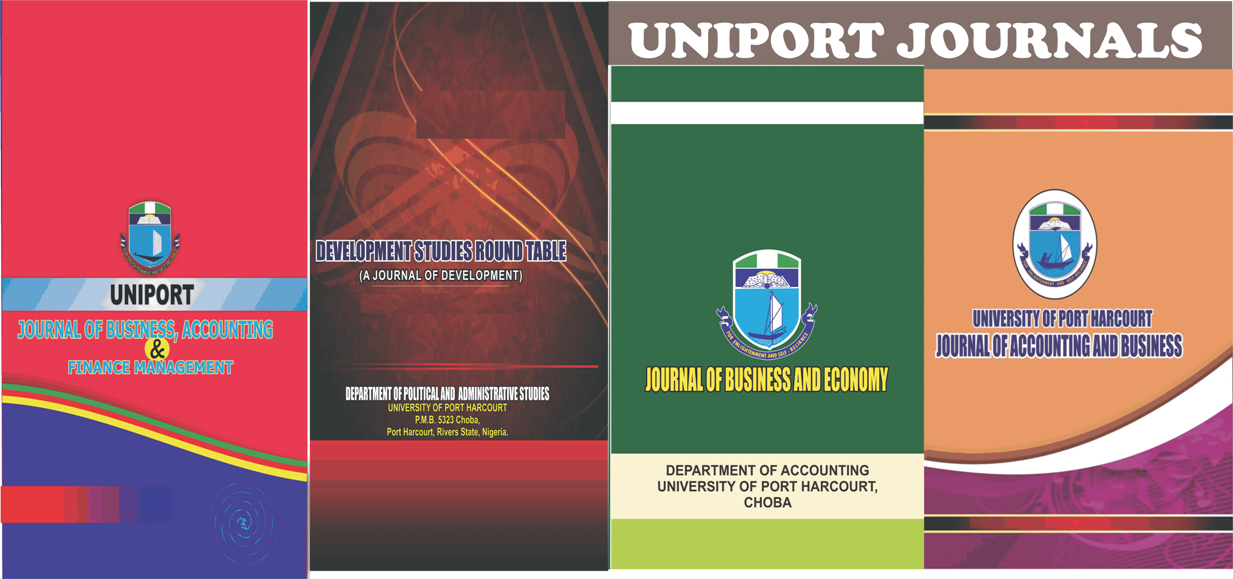2023 Archive
| 1 |
Title: AUTOMATED TELLER MACHINE FRAUD (ATMF) AND FINANCIAL PERFORMANCE OF DEPOSIT MONEY BANKS....pdf Author: Prof. Ihe Ndubuisi John, Assoc. Prof. Chukwu Luke & Ebere Nelson Chukwudi Ph.D Abstract: The study examined the effect of automated teller machine fraud on financial performance of deposit money banks in Nigeria from 2010 – 2020. Dependent variables are financial performance proxied with Return on Assets (ROA) and Return on Equity (ROE) while independent variable is automated teller machine fraud obtained from annual report of Nigeria Deposit Insurance Cooperation (NDIC) financial statement. The study used the ordinary least square of e-view 9 for the analysis. Two hypotheses were formulated for the study. The result of the findings shows that insignificant relationship exists between automated teller machine frauds (ATMF) and return on asset and return on equity of deposit money banks in Nigeria. The study therefore recommended that Banks management should create awareness and educate customers on how to identify ATM fraud practices in order to reduce Automated teller machine fraud activities. View |
| 2 |
Title: INTERNATIONAL FINANCIAL REPORTING STANDARDS AND PROFITABILITY OF QUOTED MANUFACTURING ....pdf Author: Prof. E.C Umeaka, Prof. Ngozi G. Iheduru & Akpeekon, Barisua PhD Abstract: The study examine international financial reporting standards and profitability of quoted manufacturing firms in Nigeria. Data for the study was obtained mainly from secondary sources of the sampled manufacturing firms which were subjected to statistically analysis using T-test statistical tool. Multiple regression analysis and the Pearson Product Moment correlation were used to test the difference in the performance between the pre and post IFRS periods of the listed consumers’ goods firms in Nigeria. The study revealed that there is a significant difference between Net profit Margin (NPM), profit after tax and Gross profit margin share of listed quoted firm in Nigeria during the pre and post IFRS periods. It was therefore recommended that the post IFRS standards should be retained and regulatory financial agencies, internal and external auditor should ensure strict compliance to IFRS standards in Nigeria. View |
| 3 |
Title: DIVIDEND PAYMENTS AND PROFITABILITY OF SELECTED QUOTED OIL AND GAS COMPANIES....pdf Author: Nwosu Uzochukwu Stanley & Prof. John Ndubuisi Ihe Abstract: This study sought to examine effects of dividend policy on share value of oil and gas companies quoted at Nigerian Stock Exchange. To answer the research question, the study used the ex-post facto research design. Study population comprised of 19 companies of oil and gas companies quoted on the Nigerian Stock Exchange. The study used a secondary data extracted from the annual financial reports of public quoted oil and gas companies in Nigeria for the period of 5 years, from the 2011 to 2015. The data analysis techniques of the study adopted the inductive and empirical methodological framework and the data obtained was tabulated and statistically analyzed using E-views. The study findings established that the estimated coefficient of the regression parameters have both positive and negative signs. The study also found that the dividend policies of quoted companies in Nigeria are significantly influenced by their earning and previous year dividend. The study concluded that dividend policy has a great impact on the share market price of publicly quoted oil and gas sector of the economy. The study recommended that firms should try all their possible best in improving their total earnings from each transaction year, since recent study reveals that it now has greater impact than any other factor in determining the market share value for Nigerian firms. Firms should strive to formulate a dividend policy that ensures continuity and stability in dividend payment as this has impacts on the value of the firm. Investors should be interested in understanding the components of the annual reports as a better understanding would lead to better and more profitable investment. Investors should not only rely on the annual report but should also strengthen their knowledge and understanding of their investment through newspapers, magazines, stock exchange market and even from advice of stock brokers. View |
| 4 |
Title: TAX LEAKAGES AND TAX REVENUE EVIDENCE FROM RIVERS STATE INTERNAL REVENUE ....pdf Author: Amaefule, Leonard Ifeanyi Ph.D & Kpurugbara Nwinee Ph.D Abstract: This study evaluate “Tax Leakages and Tax Revenue; Evidence from Rivers State Internal Revenue Service Port Harcourt (2009-2018) was carried out using time series data from Rivers State Board of Internal Revenue. Descriptive research design was adopted for the study. While regression was used for data analysis further subjected to E-views. The result of the findings revealed a positive relationship between tax leakages and revenue and significantly related with tax revenue of company income tax. The leakage also has effect on the company income tax. The tax avoidance and evasion has no significant relationship with tax revenue of company income tax. The study concludes that the policy implication was to reduce tax leakages. However, tax evasion and avoidance was significantly related to tax revenue of company income tax. Therefore, recommend among others, that government should promote high rate of tax compliance to fight against tax leakages and tax evasion for economic benefit of Rivers State; should review the tax system, to implement strict and severe penalties on tax evaders. Also, that expert be engaged in tax matters 9audit) to be able to detect non-compliant and leakages in the system. Tax payers need to be given incentives as motivation for payments of taxes. View |
| 5 |
Title: GOVERNMENT EXPENDITURE AND ECONOMIC DEVELOPMENT IN NIGERIA (2000-2021)....pdf Author: Prof. Ngozi Iheduru, Assoc. Prof. L.C. Chukwu & Chima, Ambrose Ndobuisi Abstract: This research examined the relationship between Federal Government Expenditure and Economic development in Nigeria from 2000 to 2021. The government of Nigeria has been implementing various fiscal measures (government expenditure) to ensure economic development, this study seeks to examine their effectiveness. The quasi-experimental design and ex-post-facto data were adopted for the study. Data for the research analysis were sources from reliable institutions such as the Central Bank of Nigeria (CBN) Bulletin, Budget office of Nigeria, Federal Bureau of Statistics (FBS). Four Null-hypotheses were formulated, tested and result interpreted. The study also employed regression analysis. Findings of the study revealed that the Federal governments capital expenditures on human capacity building are not commensurate with the countrys economic growth rate. Again on Recurrent expenditure, government was spending a lot of money on various administrative costs associated with the Human Development Index (HD1), while neglecting the significant investment that can yield better returns. The capital expenditure on per capita income do not have visible presence in the national budget, hence the lack of positive impact on PCL Also, spending a lot of money on various administrative costs was found not to have any significant impact on the per capita income of the country. Recommendations: Based on the findings of the study, the following recommendations were made; in order to accelerate economic development in the country, the amount of money spent on recurrent expenditure should be reduced and directed towards capital investments, to ensure that the countrys resources are used effectively and efficiently, the government should maintain its fight against corruption. Again, Government should ensure that the policies and procedures related to the allocation of funds are thoroughly implemented. View |
| 6 |
Title: PUBLIC DEBT AND HUMAN DEVELOPMENT IN NIGERIA (2003-2021)....pdf Author: Dr. N.G. Iheduru, Dr. L. C. Chukwu & Dr. O.O Ajaero Abstract: This study evaluates the effect of public debt on human development for the period 2003 to 2021 in Nigeria. Public debt was disaggregated into total debt (TD), foreign debt (FD) and domestic debt (DD) while human development was proxied with human development index (HDI). Annual data were obtained from Central Bank of Nigeria Statistical Bulletin and United Nations Development Programme (UNDP) Human Development Report for the period. Augmented Dickey Fuller test of stationarity and Johansen co-integration test revealed that the annual time series data were stationary and had long run causality among the variables. Empirical results from Vector Error Correction Model showed that TD had positive but insignificant effect on HD; FD has positive and significant effect on HD while DD had negative and insignificant effect on HD. The study recommended that domestic debt should be strategically channeled towards human development endeavors such as basic education and primary health care in order to improve human development in Nigeria. View |
| 7 |
Title: COMPETITOR POSITION MONITORING AND FINANCIAL PERFORMANCE OF QUOTED MANUFACTURING FIRMS....pdf Author: Yikarebogha, Erorogha Akpos & Amaefule, Leonard Ifeanyi Abstract: The study examined competitor position monitoring and its effect on the financial performance of quoted manufacturing firms in Nigeria, spanning the period 2011 – 2020. Competitor position monitoring was to relate the financial performance which was represented by net profit before tax, return on equity, earnings per share, and return on assets. The population of the study is the sixty (60) quoted manufacturing companies as at 2012. Data was obtained from the financial statements of the companies studied, as well as from the Nigerian Exchange Group. The study adopted both descriptive and inferential statistics for the analyzing of the data, this study goes further adopted panel data technique, the panel Autoregressive Distributed Lag (P-ARDL). The results obtained showed p-values of 0.0000 for CPM and NPBT, CPM and ROE, and CPM and EPS respectively, which are less than the 0.05 level of significance. On CPM and ROA, a p-value of 0.0171 which is less than the 0.05 level of significance was obtained, thus, leading to the rejection of all four null hypotheses. We therefore concluded that competitor position monitoring has significant effect on financial performance, and recommended that firms should develop competitive intelligence for the purpose of assessing and utilizing of real time market information. This will help them to constantly understand the cost structure and the market position of their competitors. Integrating technology for market data gathering can help them achieve this. View |
| 8 |
Title: TAXATION AND ECONOMIC DEVELOPMENT OF NIGERIA (2000-2020)....pdf Author: Chukwu, Luke Chukwuka, PhD & Kwem-Anyanwu, George, M.Sc Abstract: This study evaluated the effect of tax revenue on Nigeria’s economic development. To achieve this objective, the impacts of petroleum profit tax (PPT), company income tax (CIT) and custom duty (CD) on Nigeria’s capital infrastructure development and GDP-per capita were examined, from which relevant hypothesis were formulated. The study used secondary data (extracted from CBN annual statistical bulletin for the years under study (2000-2020). The formulated hypotheses were tested using multiple linear regression models with the aid of SPSS version 21. Following the series of empirical tests conducted, it was found that petroleum profit tax (PPT), company income tax (CIT), and custom duty (CD) have an aggregate effect on Nigeria’s capital infrastructure development (CIFD). This is evident with the value of the R2 of approximately 62% indicating that changes in Nigeria’s CIFD as an economic development indicator are influenced by the values of tax revenue. The tax revenue proxies also showed a high combine effect on Nigeria’s GDP-per capita. The study further revealed that PPT and CD both have positive effect on CIFD while CIT have negative effect on CIFD. Model two results show that all tax revenue proxies have positive effect on GDP-per capita. However, the effect of custom duty (CD) was found to be insignificant. Consequently, it is recommended that government apply tax revenue generated to provide capital infrastructure thus creating an enabling environment that is good enough for those sectors of the economy to thrive. View |
